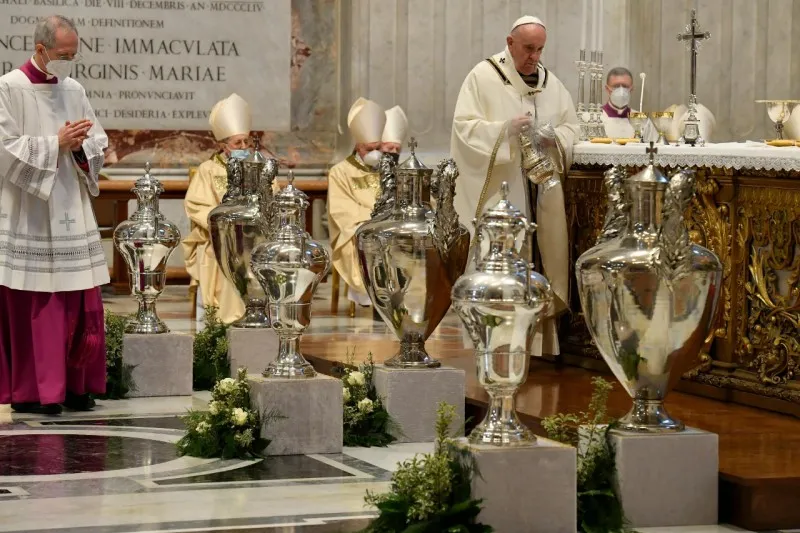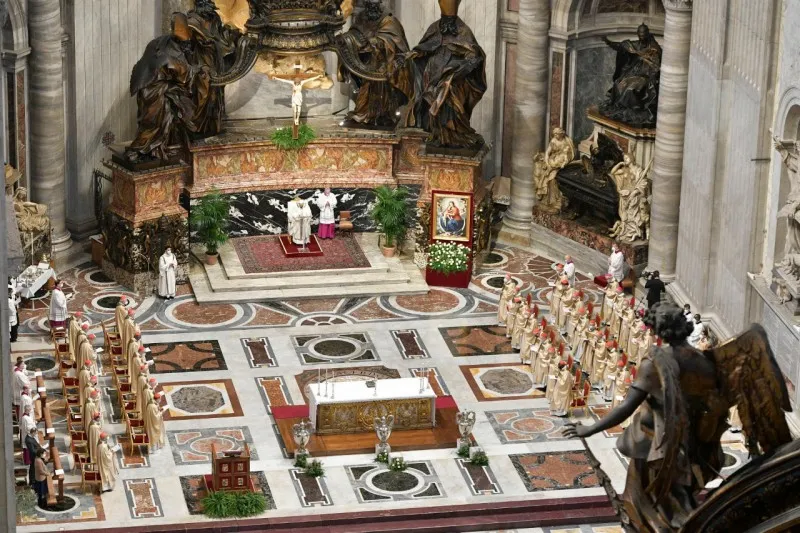
Vatican City, Apr 1, 2021 / 05:00 am (CNA).- Pope Francis told priests at Thursday’s Chrism Mass at the Vatican that “the cross is non-negotiable” when preaching the Gospel.
“The preaching of the Good News is mysteriously linked to persecution and the cross,” Pope Francis said in his homily on April 1.
The pope went further to say that “the preaching of the Gospel is effective not because of our eloquent words, but because of the power of the cross.”
The Chrism Mass of Holy Week is the Mass at which the pope, as the bishop of Rome, blesses the Oil of the Sick, the Oil of Catechumens, and the Chrism Oil, which will be used throughout the diocese over the coming year.
This year, fewer than 100 priests from the Diocese of Rome were allowed to concelebrate the Mass and renew their priestly vows in St. Peter’s Basilica due to COVID-19 restrictions.

At the Mass offered at the basilica’s Altar of the Chair, the pope emphasized that the cross was present in the Lord’s life “from the very beginning.”
“It is there in the persecution of Herod and in the hardships endured by the Holy Family, like those of so many other families obliged to live in exile from their homeland,” he said.
The pope also explained how “over and over again in the Gospels” Jesus’ preaching is met by envy, rejection, and scorn.
“The closeness of Jesus, who dines with sinners, wins hearts like those of Zacchaeus, Matthew and the Samaritan woman, but it also awakens scorn in the self-righteous,” Francis said.
The presence of the cross throughout the Lord’s life and preaching “makes us understand that the cross is not an afterthought, something that happened by chance in the Lord’s life,” the pope said.
“It is true that all who crucify others throughout history would have the cross appear as collateral damage, but that is not the case: the cross does not appear by chance.”
Pope Francis said that mere circumstances did not condition the saving power of the cross.
“Why did the Lord embrace the cross fully and to the end? Why did Jesus embrace his entire Passion: his betrayal and abandonment by his friends after the Last Supper, his illegal arrest, his summary trial and disproportionate sentence, the gratuitous and unjustifiable violence with which he was beaten and spat upon? If mere circumstances conditioned the saving power of the cross, the Lord would not have embraced everything. But when his hour came, he embraced the cross fully. For on the cross there can be no ambiguity! The cross is non-negotiable,” he said.

The pope shared a story with the priests, a memory from his own experience in priestly ministry in Argentina.
“Once, in a very dark moment in my life, I asked the Lord for the grace to free me from a difficult and complex situation. A dark moment,” he said.
“I had to preach the Spiritual Exercises to some women religious, and on the last day, as was customary in those days, they all went to confession. One elderly sister came; she had a clear gaze, eyes full of light — a woman of God.”
“At the end of the confession, I felt the urge to ask her a favor, so I said to her, ‘Sister, as your penance, pray for me because I need a particular grace’… If you ask the Lord for it, surely he will give it to me.’”
“She paused for a moment and seemed to be praying, then looked at me and told me, ‘The Lord will certainly give you that grace, but make no mistake about it: he will give it to you in his own divine way’.
Pope Francis concluded: “This did me much good, hearing that the Lord always gives us what we ask for, but that he does so in his divine way. That way involves the cross, not for masochism, but for love, love to the very end.”
If you value the news and views Catholic World Report provides, please consider donating to support our efforts. Your contribution will help us continue to make CWR available to all readers worldwide for free, without a subscription. Thank you for your generosity!
Click here for more information on donating to CWR. Click here to sign up for our newsletter.



“The Lord always gives us what we ask for, [although] involving the cross, not for masochism, but for love”. Bizarre exhibitionist penitence is well known in the Philippines during Lent, and less in our Southwest. Cut off from the Church for centuries Mestizo Catholics living in the rugged mountains then virtually inaccessible places like Red River NM would submit to cruel flagellation. Known as the Flagellantes. An interesting historical article: “Members of Fanatical Creed Torture Themselves as Part of Religious Ceremony. Santa Fe. N. M. —Penitentes remain In the United States to this very day. Within the last month their activities have been repeatedly observed In northern New Mexico in the counties of Taos, Colfax. Rio Arriba, Mora, San Miguel, Sandoval, and Valencia. This cult of flesh torturers, popularly supposed to have become extinct better than a century ago, believes heavenly bliss can be obtained by torturing the body. They are supposed to be a long removed survival of the Flagellantes. a sect organized in Italy In 1210 A. D. In the Sixteenth century the fanatical creed broke out again, and Pope Clement VI Issued a papal bull against them March 25, 1671. From Spain and Portugal the sect was brought to Mexico and it has survived principally among the Indians and half breeds in those thinly settled counties of New Mexico” (FLAGELLANTES STILL SURVIVE IN NORTHERN PARTS OF NEW MEXICO Cambridge Sentinel, Volume XXIII, Number 8, 5 March 1927). Notice in 1927 Mestizos were still called “half breeds”. The sect survives today sans flagellation [to my knowledge] known simply as the Penitentes. Most have returned to the Church members intermingled at Mass with more traditional Mestizo Catholics. Penitentes nevertheless have their own ‘prayer houses’, small chapels known only to them where they believe they retain the true faith and practice secret [non violent] ceremonies use codewords among themselves. And elders the equivalent of priest shamans. When I arrived at a parish on the Jicarilla Res [now called Nation] I was invited to visit a prayer house. All friendly though secretive. Penance still seems exaggerated though kept to themselves rather than as an exhibition. My response mainly from the pulpit on Sundays was that the true indication that our penitence had spiritual purchase was evidence of a charitable, compassionate life. I have to admit the Penitentes were among the more affable and friendly toward me as a traditional Catholic priest. Catholicism in these stretches of the Southwest is multi-faceted, culturally diverse, and vibrant. In my estimate evidence of the Holy Spirit at work in his own providential way.